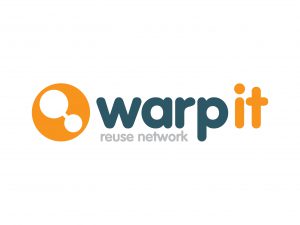A: Aerosols, Aluminium Cans/Foil, Asbestos Waste, Appliances.
more
Aerosols
On Campus: Some aerosols are categorised as hazardous waste, so please DO NOT put aerosols into any bins on campus. If the aerosol has been used for University business purposes, contact Sustainability Services for recycling information (disposal is chargeable to the department).
Off Campus: Check with your local council, as some may permit empty household aerosols to be placed in the mixed recycling. Alternatively, take to your household waste recycling centre. Ensure that the aerosol is completely empty before you decide to recycle it. Do not pierce, crush or flatten the aerosol before recycling.
Aluminium Cans/Foil
Please wash out as best as you can before placing in the green-lidded Mixed Recycling bins located across campus.
It's important to note that items such as crisp packets are not made of aluminium foil. Do the scrunch test: scrunch an item in your hand, if it springs back it is not aluminium, so should be put in the general waste bin.
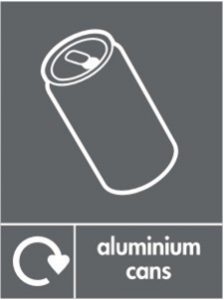
Asbestos Waste
Health and Safety Services have published information about asbestos on University premises
Appliances
See Electrical Appliances.
C: Cardboard, CDs, Chemicals, Cling film, Clothes & Textiles, Confidential, Catalogues, Cables, Clinical, Cooking Oil, Coffee Grounds & Tea Bags, Crisp Packets.
more
Cardboard
There are Paper and Cardboard recycling bins (with blue lids) inside and outside most University buildings, which have labels on them with either pictures or text about what types of paper and card items can be recycled. Small quantities of paper and card can also be placed in the Mixed Recycling bins (with green lids). Paper cups should not be put in the Paper and Card recycling bins, but should be put in the dedicated bins for paper cups (with pink labels) that are found in main building foyers.
CDs, DVDs, Disks & Tapes
CDs, DVDs, cassette tapes and floppy disks cannot be put into the recycling bins on campus.
On Campus only: To dispose of all types of media (e.g. cassettes, floppy disks or CDs and DVDs) which contain confidential information, please complete the online disposal form and they will be collected for secure disposal. This service is chargeable to University departments. Only media without confidential information should be placed in the General Waste bins.
Chemicals
On Campus: A bulk collection of chemical waste is arranged every six months (normally around Easter and again during September/October) for University departments. Careful identification and listing is a requirement of this service. The cost of the service is charged back to departments according to the types and quantities of waste involved. If you require an urgent collection, or have items which cannot wait until the next bulk collection, please contact Sustainability Services.
Off Campus: Check if disposal instructions are provided on the container. Most items will need to be taken to your local household waste recycling centre.
Cling film
Cling film is non-recyclable, please place in the General Waste bins.
Clothes & Textiles
On Campus: Donations (e.g. to charities) of unwanted clothing may be possible subject to permission being granted by the Procurement Department.
Off Campus: Please consider donating items in good condition to local charity shops, or selling them yourself via a second-hand goods website/app. For students living in halls of residence, there may be textile and clothing recycling bins provided for your use. Textile recycling points are commonly found at large supermarkets.
Confidential Waste Papers
On Campus only: Paperwork that contains confidential information should not be put in standard waste or recycling bins. All confidential waste papers should be placed in designated sacks for shredding and stored securely (or in a Datasafe console, if there is one in your area).
Empty confidential waste shredding sacks can be requested by sending an email to Sustainability Services (staff in Whiteknights House please contact the Postroom). Only fill the sacks with paper up to the line on the side. Plastic covers, comb bindings, lever arch/ring binders and metal bindings must be removed (although staples and paper clips are acceptable in small quantities). When sacks are ready for shredding (or a Datasafe console is full), please complete the online Waste Disposal Request Form to request a collection by the Porters. The paperwork will be stored securely by the Porters and then shredded by our waste management contractor (with the paper recycled).
For large clear-outs or disposal of boxes of archived materials, please contact Sustainability Services to discuss options.
Catalogues
Catalogues (and brochures) can be placed in the blue-lidded Paper and Card Recycling bins.
Cables
On Campus: Please DO NOT put cables from electrical equipment into general waste bin. Cables associated with IT equipment should be collected via the free-of-charge 'Reuse & Recycle Service' offered by Digital Technology Services (DTS). For non-IT cables, please submit a disposal request via the online Waste Disposal Request Form - this service is chargeable to departments.
Off Campus: Please take these to your local household waste recycling centre.
Clinical Waste
Clinical waste is any waste which poses a threat of infection to humans. The term also includes drugs or other pharmaceutical products.
On Campus Only: Clinical waste should be placed into specialist yellow containers designed for the containment and disposal of waste that is hazardous to health - these can be obtained via the Chemistry Stores or by placing an order with Sustainability Services. When full and sealed, these containers should be place into the external yellow wheelie bins. The disposal of clinical waste is chargeable to departments. Please DO NOT put any clinical waste into Recycling or General Waste bins.
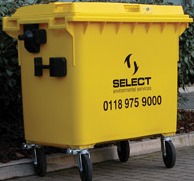
Cooking Oil
Waste cooking oil from restaurants should be stored in drums with a secure lid to prevent spills; and then put into a bunded external store. These drums will be collected by a University-approved waste contractor and the oil turned into biofuel. Please contact Catering services for more details.
Coffee Grounds & Tea Bags
On Campus: Coffee grounds from the main catering outlets are collected and then sent for treatment by Anaerobic Digestion to make electricity and fertiliser. In all other areas, coffee grounds and tea bags should either be put in a Food Waste caddy/bin, or be put in a General Waste bin - the contents of which are then sent to an Energy from Waste facility to generate electricity, not sent to landfill.
Off Campus: Coffee grounds and tea bags can be put in your food waste caddy, if your council or halls provide this service. Otherwise, try composting them yourself, using the coffee grounds as mulch in the garden, or dispose of in the general waste.
Crisp Packets
On Campus: Crisp packets are not collected separately on campus, so please place them in the General Waste bins. Crisp packets are not made from aluminium foil - they are made from plastic sprayed with a very thin layer of metal.
Off Campus: Crisp packets can be collected for recycling via certain schemes such as Terracycle which have limited off-site collection points. Some large supermarkets will take crisp packets in their 'soft plastics' collections for recycling.
E: Electrical Appliances, Envelopes, Expanded Polystyrene.
more
Electrical Appliances
On Campus: For University-owned items, please submit a disposal request via the online Waste Disposal Request Form. The Portering team will collect these items and then send them for recycling. This service is chargeable to departments. If you have a particularly heavy or bulky item, and for all fridges/freezers, please contact Sustainability Services. For IT equipment, DTS has launched the 'Reuse & Recycle Service.
Off Campus: If you are a student living in halls of residence, please check if your hall has a collection point. Otherwise, items should be recycled at your local household waste recycling centre.
Envelopes
On Campus: Re-use envelopes wherever possible, especially for internal mail, or put them in the blue-lidded Paper and Cardboard Recycling bins (if available) or green-lidded Mixed Recycling bins.
Off Campus: Remove the stamps and collect them for charities who sell them on to raise money for their cause. Recycle in line with local guidelines.
Expanded polystyrene (EPS)
On Campus: Blocks of white EPS can now be collected for recycling by putting them in the designated wheelie bins at the back of JJ Thomson building. Small chips/nuggets of EPS should be put into a sealed/tied-up bag and put into a general waste bin.
G: Green Waste, Glass.
more
Green Waste
The University composts most of its green waste (e.g. hedge trimmings, leaves, twigs) for reuse across the grounds of the estate. Green waste should not be brought to campus from home; it cannot be composted or disposed of on campus.
Glass
On Campus: There are Glass Recycling bins, or Bottle Banks, outside many buildings across the campuses - glass bottles and jars should be emptied, and any tops or corks removed before recycling.
Heat-proof glass (borosilicate), such as Pyrex or Duran, should not be put in the glass recycling bins or bottle banks, so should be placed in the General Waste bins; however, there are special wheelie bins available for collecting heat-proof glass in bulk, so please contact Sustainability Services for more details.
Empty glass Winchesters that have contained chemicals can be recycled in the Glass Recycling bins or Bottle Banks, but these should be washed out first, have the lids removed, and have their labels removed or obviously crossed out with marker pen (or have the word ‘EMPTY’ written on them), or else bottles will be considered to be hazardous waste.
Look out for bottle banks and wheelie bins for recycling glass which are located outside buildings.
Whiteknights campus glass recycling location map
London Road campus glass recycling location map
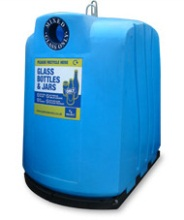
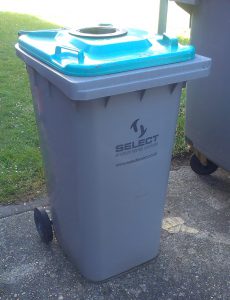
Contact Sustainability Services to discuss the disposal of large amounts of laboratory glassware, heat-proof glass or broken glass.
Off Campus: Some councils will collect glass bottles and jars as a kerbside service. Bottle banks are also frequently located at large supermarkets or public spaces.
I: IT Equipment, Ink Cartridges.
more
IT Equipment
On Campus: All spare/unwanted IT equipment, mobile phones and other data-holding devices that are owned or managed by the University must be collected via the free-of-charge 'Reuse & Recycle Service' offered by Digital Technology Services (DTS). This will enable DTS to re-distribute suitable IT equipment for reuse on site, or enable the University's authorised contractor to data-wipe devices for onward reuse or recycling in-line with University's IT Equipment Disposal Policy.
For the collection and disposal of non-IT electrical equipment, please complete the online disposal request form. For larger collections please contact Sustainability Services.
Off Campus: Please read the University's IT Equipment Disposal Policy and the Bring Your Own Device Policy if you are using a device that is not owned/managed by the University for your University work.
Ink Cartridges
See Printer/Photocopier Consumables.
M: Medicines, Metal, Microwaves, Mobile Phones, Monitors & TVs
more
Medicines
See Clinical Waste.
Metal
On Campus: Metal tins, cans and foil should be placed in the green-lidded Mixed Recycling bins. All other metal items can be recycled, but need to be collected in a different way - please submit a disposal request via the online Waste Disposal Request Form.
Microwave ovens
See WEEE for more details.
Mobile Phones
All mobile telephones that are no longer required should be returned to DTS (Digital Technology Services). All handsets will be securely disposed of and all data from will be wiped. DTS will update the University system with the phone number and IMEI for audit purposes.
See also IT Equipment.
Monitors & TVs
Computer monitors should be returned to DTS via their 'Reuse & Recycle Service' (also see IT Equipment). TVs should be disposed of via the Waste Disposal Request process (also see WEEE).
O: Oil, Ovens.
more
Oil
The storage of large amounts of oil must comply with legislation to prevent pollution. Small amounts of oil can also cause harm to the environment if spilt or poured down drains.
On Campus: All waste oils, except edible oil, are deemed hazardous under Hazardous Waste Regulations. To dispose of any type and quantity of oil please contact Sustainability Services for advice. Waste oil containers should be sealed and stored securely. Large amounts of oil should be contained in double-skinned containers with a bund that is big enough to contain 110% of the maximum capacity.
Off Campus: Waste oil can be taken to your local household waste recycling centre.
See also: Cooking Oil
Ovens
Ovens are classed as electrical equipment, so see WEEE for more details.
R: Recycling Collections, Radioactive Waste, Roller Banners, Rubber Bands.
more
Recycling Collections
Recycling bins are located across the University estate, both inside and outside buildings. Collections are carried out daily by our cleaning staff and porters. Our contractor, Select Environmental Services, collects different materials from across the estate and transfers them to reclamation facilities, where they are treated.
Radioactive Waste
On Campus Only: The University requires a permit from the Environment Agency for radioactive materials - please contact Health and Safety Services Scientific Safety Adviser on extension 8887 for more information.
Roller Banners
CPS may be able to reuse the newer type of roller banners, please contact cps@reading.ac.uk for further information.
Rubber Bands
You can reduce the number of bands we need to purchase each year by simply returning your bands to the Post Room in an envelope marked 'Rubber Bands - Post Room'.
T: Textiles, Televisions, TetraPak cartons, Tyres, Toner Cartridges, Tin Cans.
more
Textiles
See Clothing and Textiles.
Televisions
See Monitors and TVs.
TetraPak Cartons
TetraPak and other similar cartons are made from a composite material consisting of cardboard and plastic (and sometimes aluminium foil), which cannot be recycled through the standard mixed recycling collections. We do have separate bins for TetraPak-style cartons, which are situated at our restaurants and cafes, so that they can be collected and sent back to the manufacturers for recycling. Please do not put these types of cartons in the Mixed Recycling bins.
Tracing Paper
Tracing paper cannot be recycled within our current recycling collections. It can be made from various different materials - not always actually paper - please place in the General Waste bins.
Tyres
There is a ban on tyres being sent to landfill.
On Campus: Tyres from personal vehicles should not be disposed of anywhere on campus or at the Halls of Residences. Please contact Sustainability Services for disposal advice for tyres from University activities.
Off Campus: For disposal advice for tyres from personal vehicles, consult your local council.
Toner Cartridges
See Printer/Photocopier cartridges and consumables.
Tin Cans
These are made of steel or aluminium making them 100% recyclable; and can be reprocessed again and again without loss of quality.
Please dispose of empty metal cans in the green-lidded Mixed Recycling bins.
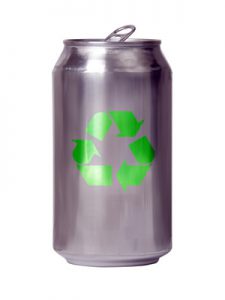
W: Washing Machines, WEEE, White Goods, Wood.
more
Washing Machines
See WEEE
See also White Goods.
WEEE
Waste Electrical and Electronic Equipment (WEEE) is the name given to any item that is powered via mains electricity or by batteries; such as a kitchen appliance, mobile phone, computer, TV.
WEEE items should not be placed in General Waste bins, but must be collected separately.
On Campus: For data-holding equipment, such as computers, laptops, mobile phone and all IT equipment, please use the 'Reuse & Recycle Service' offered by DTS. For non-IT equipment, please complete the online disposal request form. WEEE can also be deemed as hazardous waste i.e. fridges and freezers, CRT screens and batteries. These items need to be stored safely and securely to prevent pollution and to prevent risk to health.
Off Campus: Electrical items can usually be disposed of at your local household waste recycling centre. Your local council may also provide a bulky waste collection (e.g. for white goods).

White Goods
Includes fridges, freezers, cookers, washing machines and dishwashers. See WEEE.
Wood

Solid Wood is Recyclable!
MDF or Laminate is not recyclable.
On Campus: If your department has any solid wood to be disposed of (pallets or broken furniture) this can be recycled. Chipboard, MDF or laminate, is not recycled. Please submit an online disposal request form.
Off Campus: Wood can usually be recycled at your local household waste recycling centre. However some charities accept donations of wood for social enterprise projects or broken wooden furniture to repair (e.g Oxford Wood Recycling)
B: Batteries, Borrow, Books & Brochures, Box Files, Bottles, Bulbs, Bin Bags, Biological Waste, Bicycles.
more
Batteries
Please DO NOT dispose of any batteries in the general waste bins.
On Campus: Please do not bring in batteries from home. Small dry-cell batteries (e.g. AA, AAA) used for University business purposes can be sent in an envelope via the internal post to 'Battery Recycling - Post Room, Whiteknights House' free of charge. There are also battery collection points for small batteries in some buildings. For larger batteries, such as lead-acid or Ni-Cd batteries, and all Lithium-ion/Lithium-polymer batteries (including those that are damaged or swollen), contact Sustainability Services for storage and disposal advice - the costs of disposing of these batteries will be re-chargeable to the department. Read advice from health and Safety Services about dealing with damaged/swollen lithium batteries.
Off Campus: You can recycle batteries at most larger shops - if they sell batteries, they should offer facilities for recycling old batteries. Contact your local council if you have a damaged or swollen battery for disposal.
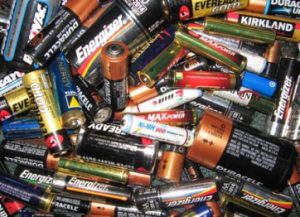
Borrow
Reading has its own Library of Things where for a small membership fee you can borrow all sorts of household items. Find out more at their website.
Books & Brochures
Books should be offered for re-use, if possible.
Paper-backed books, magazines and brochures can be placed in the blue-lidded Paper and Card Recycling bins across the University.
Individual hard-backed books should have the covers removed before the paper is placed in the Paper and Card Recycling bins, and the cover should be put in the General Waste bins. The Porters can also collect hard-backed books for recycling as part of the Waste Disposal Request process. For departments that want to dispose of a lot of hard-backed books, our waste contractor can offer a bespoke recycling service - contact Sustainability Services for more details.
Box files
Box files are normally made from a combination of paper and wooden sections, so cannot be put in the Paper & Cardboard Recycling bins, unless the wood is first removed.
On Campus: They can also be advertised for re-use to the rest of the University via Warp-it.
Bottles
See Plastic Bottles or Glass Bottles.
Bulbs (lightbulbs)
See also Fluorescent Tubes and Projector bulbs.
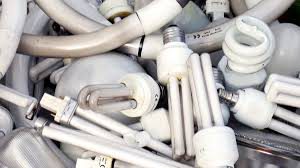
Do not recycle lightbulbs in glass recycling bin as they are made from a different type of glass and also contain metal parts; they will need to be collected separately.
Old style bulbs (i.e. non-energy saving bulbs, non-halogen bulbs) are NOT recyclable. Please dispose of these in the general waste.
On Campus Only: If you have fluorescent tubes/bulbs or LED bulbs, these need to be collected separately, so please check with Sustainability Services about how to do this.
Bin Bags
On Campus: Clear plastic bags are used at the University for segregating mixed recycling and non-recyclable general waste, so that we can see what is being collected to ensure that the correct things are sent for recycling. If you require any clear bags (e.g. you are having an office clear out and will be generating large quantities of waste) please contact Cleaning Services to obtain these (charges may apply). Black plastic bags are now only used for certain types of non-recyclable waste, such as hand towels, or from autoclaves in labs.
Off Campus: Please check with your local council whether you need to use a particular coloured bag for your general waste or recycling collections.
Biological Waste
On Campus: This is overseen by Technical Services, so please contact the Technician or person responsible in your area for disposal of biological waste.
Bicycles
On Campus: Please contact Sustainability Services for advice on the disposal of bicycles owned by the University - these will normally be refurbished for future re-use.
Off Campus: Even if your bike is in bad condition, it could still be re-used. Some organisations (Re-Cycle) take old bikes and refurbish them for charity or community projects. Or sell it! Try advertising on the University notice boards or in local ads.
D: Directories, Drinks Cans, DVDs.
more
Directories
Directories can be placed in the Paper and Card recycling bins.
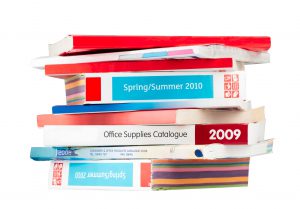
Drinks cans
Please empty out any liquid and put in the green-lidded Mixed Recycling bins.
DVDs
See CDs, DVDs, disks and tapes.
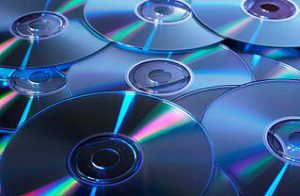
F: Fluorescent Tubes & Projector Bulbs, Fridges & Freezers, Furniture, Fly-tipping, Folders, Food Waste.
more
Fluorescent Tubes & Projector Bulbs
On Campus: Fluorescent tubes and compact fluorescent lamps (CFL), as well as bulbs from projectors, are classified as hazardous waste. Don't put these in any recycling bins on campus - please contact Sustainability Services for advice.
Off Campus: Some larger supermarkets offer recycling points for household fluorescent (energy saving) bulbs. Otherwise take them to your local household waste recycling centre.

Fridges & Freezers
On Campus: These are classed as a type of hazardous waste and must be disposed of in an environmentally responsible manner. Fridges and freezers from laboratries must be cleaned and decontaminated before collection, in such a way as to remove or render harmless any:
- Microbiological agents
- Chemical compounds
- Biochemical compounds
- Radioactive compounds
- Hazardous substances.
Collection and disposal of fridges & freezers is a chargeable service. Please contact Sustainability Services to book a fridge or freezer collection.
Off Campus: Your local council may be able to arrange a bulky waste collection from your doorstep, or alternatively take to your local household waste recycling centre.
Furniture
On Campus: If you have any unwanted furniture, office stationery or supplies that are in good condition, please offer them for re-use via our Warp-it platform.
If you do not have time to offer your furniture for re-use via Warp-it, and it requires disposal, please complete an online disposal request form (charges apply).
Off Campus: Some charities run furniture shops which welcome donations of furniture in good condition. Otherwise, furniture could be offered for re-use on community groups such as Freecycle or Freegle. If it cannot be re-homed, it should be taken to the local amenity tip.
Fly-tipping
It is illegal to dump waste or fly-tip it on private or public land. Fines can be as high as £20,000 and even imprisonment. If you see someone fly-tipping waste anywhere at the University, please report it to Security immediately by calling 0118 378 6300.
Folders
See Stationery
Food Waste
On Campus: Food waste is collected from all catering outlets at the University and taken for treatment by Anaerobic Digestion to generate electricity and fertiliser. In other areas, food waste can be put in a caddy/bin for collection and onward treatment. See our blog about Food Waste for more information.
Off Campus: Your local council should offer a kerbside food waste collection.
H: Hazardous Waste, Heat-proof Glass, Hard-backed Books.
Hazardous Waste
This includes, but is not restricted to the following; fluorescent tubes/light bulbs, fridges, freezers and refrigeration units, some aerosols and fire extinguishers, oils of various types, heavy metals (mercury, cadmium etc.), various chemicals (e.g. cleaning chemicals or laboratory chemicals), drugs, some batteries, IT equipment and some WEEE (waste electronic and electrical equipment).
As well as correctly identifying and handling hazardous waste, it is vital that the University only works with properly licensed waste operatives and carriers. Contact Sustainability Services for disposal information. For safety guidance on handling hazardous waste, contact Health and Safety Services on x8888.
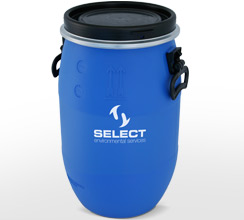
Heat-proof glass
Heat-proof glass (borosilicate), such as Pyrex or Duran, should not be put in the glass recycling bins or bottle banks, so should be placed in the General Waste bins; however, there are special wheelie bins available for collecting heat-proof glass in bulk, so please contact Sustainability Services for more details.Hard-backed books
Individual hard-backed books should have the covers removed before the paper is placed in the Paper and Card Recycling bins, and the cover should be put in the General Waste bins. The Porters can also collect hard-backed books for recycling as part of the Waste Disposal Request process. For departments that want to dispose of a lot of hard-backed books, our waste contractor can offer a bespoke recycling service - contact Sustainability Services for more details.L: Landfill, Library of Things, Light Bulbs, Lithium Batteries.
more
Landfill
Sending waste to landfill represents a loss of valuable resources, generates greenhouse gases and can degrade the surrounding environment. Wherever possible, the University diverts waste away from landfill (ideally through reducing the amount generated in the first place, re-using items, and then recycling materials); less than 2% of all our waste by weight ends up in landfill. Most of the general waste at the University is not sent to landfill; instead it goes to a plant where it is burned to generate electricity.
Library of Things
Reading has its own Library of Things where for a small membership fee you can borrow all sorts of household items. Find out more at their website.
Light Bulbs
For old-style incandescent and halogen bulbs, see Bulbs
For energy saving and projector bulbs, see Fluorescent Tubes & projector bulbs
Lithium-ion and Lithium-polymer (LiPo) batteries
Lithium batteries are generally safe and unlikely to fail, but if they are damaged or have defects, they may present a fire and/or explosion risk. Read advice from Health and Safety Services about dealing with damaged/swollen lithium batteries.
N: Nappies, Needles, Newspapers.
more
Nappies
On Campus: Small numbers of nappies can be placed in General Waste bins. However, for frequent disposals (which would then be classed as Offensive Hygiene Waste) please contact Sustainability Services for advice.
Off Campus: To help to reduce the total amount of waste going to landfill. Why not try reusable nappies
Needles
On Campus: These should be placed in yellow sharps boxes for clinical waste disposal via the clinical waste wheelie bins.
Also see Clinical waste.

Newspapers
Newspaper can be recycled in the blue-lidded recycling bins for Paper and Card - see Paper and Cardboard.
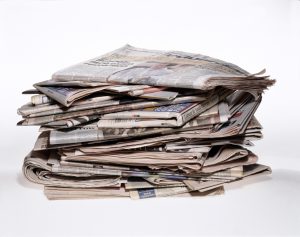
P: Plastic Bottles & Containers, Paper Cups, Paint, Paper & Card, Paper Towels & Serviettes, Phones, Printer Cartridges, Packaging, Printers.
more
Plastic Bottles & Containers
Items with the following recycling codes can be put in the green-lidded Mixed Recycling bins (but must be clean):
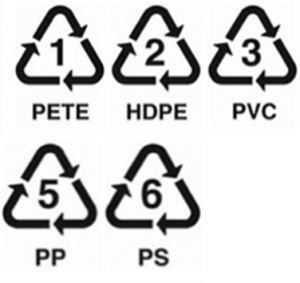
Please empty and rinse before placing in recycling bins.
Expanded polystyrene (EPS)
On Campus: Blocks of white EPS can now be collected for recycling by putting them in the designated wheelie bins at the back of JJ Thomson building. Small chips/nuggets of EPS should be put into a sealed/tied-up bag and put into a General Waste bin. DTS staff and Porters can also put EPS blocks into the designated EPS skip at the Pepper Lane compound.
Paper Cups
Paper cups used for drinks can now be recycled on Campus in special bins only - please look out for these in or near catering outlets and building foyers. Please put your paper cups in the dedicated
cup recycling collection bins with a pink label; but please remove lids, tea bags and all liquid.
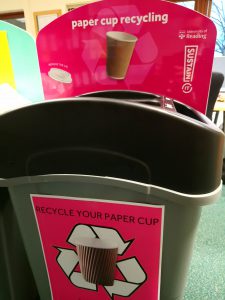
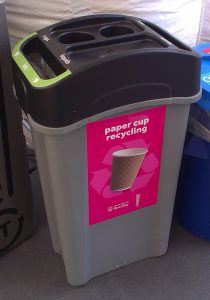
Paint
Paint is deemed to be hazardous waste under the Hazardous Waste Regulations.
On Campus: Empty tins containing residues only should be left open to completely dry, then they may be disposed of in General Waste bins. Contact Sustainability Services to arrange collection of full or partly-full tins as Hazardous Waste.
Paper & Card Recycling
See: Cardboard
Paper Towels & Serviettes
Paper towels and serviettes cannot be recycled. Please place these in the General Waste bins.
Phones – Desk phones
On Campus Only: Desk phones are deemed WEEE – please submit a disposal request via the online Waste Disposal Request Form.
Mobile phones are classed as IT waste due to their data storing capacity.
Printer/Photocopier Cartridges & Consumables
On Campus Only: The University has a recycling scheme for all the consumable components in printers and photocopiers, including all toner bottles and imaging drums. This service is free of charge.
When replacing the consumable, the old item should be placed inside the packaging that the new one came in. This should then be placed in a Konica Minolta recycling box, which can be found in most foyers, Porters Lodges and departments. Contact the Porters if the box needs exchanging for an empty one, or if you would like a box in your area.
Off Campus: Some charities collect empty ink cartridges for recycling.
Packaging waste
On Campus: Bubble wrap and similar packaging cannot be recycled at the University, so please place in the General Waste bins. Consider if bubble wrap can be used again, or advertise it on Warp-it for other University departments to use. Soft plastic packaging cannot be collected at the University, please consider collecting your own and recycling through your local Co-op store.
Blocks of white expanded polystyrene (EPS) can now be collected for recycling by putting them in the designated wheelie bins at the back of JJ Thomson building. Small chips/nuggets of EPS should be put into a sealed/tied-up bag and put into a General Waste bin.
Cardboard can be recycled in the blue-lidded Paper and Card Recycling bins. Please remove excessive tape and plastic wrapping before recycling.
Printers
See IT Waste.
S: Shoes, Stationery, Skips, Symbols, Sharps.
more
Shoes
See Clothes and Textiles.
Stationery
Please re-use stationery wherever possible.
On Campus: It can also be advertised for reuse to the rest of the University via Warp-it.
Skips
If your department is clearing large amounts of unwanted items you may want to hire a skip. Charges for this service can change quickly, but Sustainability Services can give you a current estimate.
Note that certain items are not permitted in skips, and some items will require their own dedicated skips. Please contact Sustainability Services for further information.
Soft Plastics
The university does not collect soft plastics, but you can recycle your own flexible packaging waste at your local Co-op store on Whiteknights campus. We explain further about soft plastics in our blog.
Symbols - recycling
Recycling symbols can be confusing! Check out this link to shed some light on the subject
Sharps
See Clinical Waste.

V: Vapes.
more
Vapes
Vapes contain a small battery, so should not be put into the general waste bins on campus. Please use the special Vape disposal bins that can be found in the Whiteknights Library entrance, Estates building and courtyard area of Reading Students Union.

